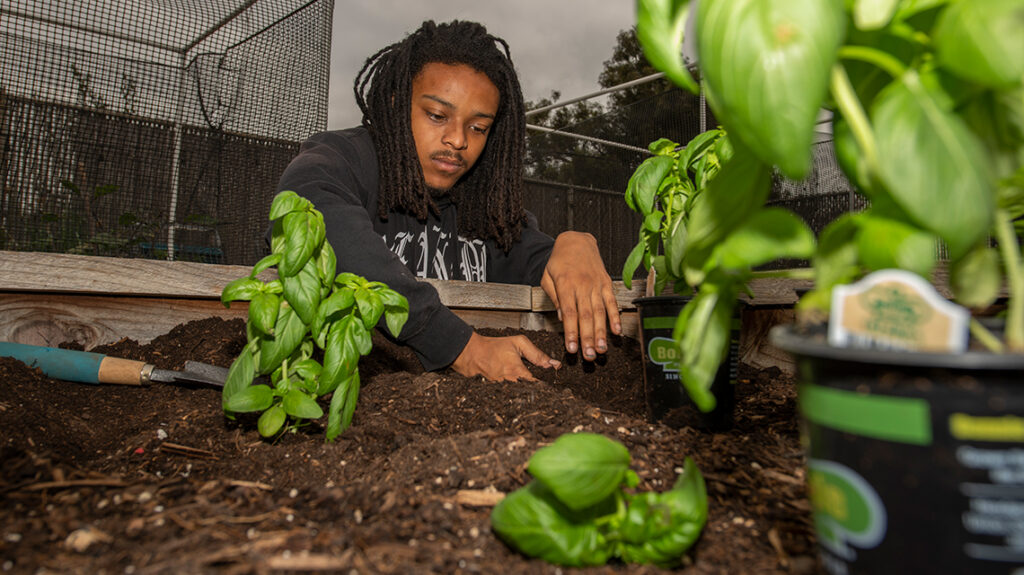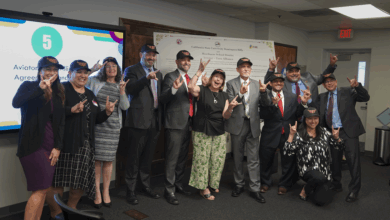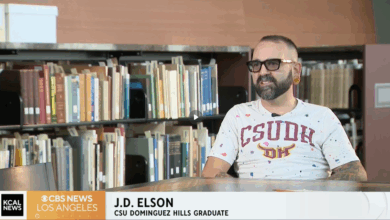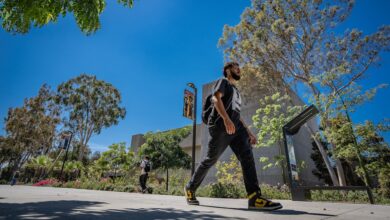
CSUDH has achieved a STARS Gold rating by the Association for the Advancement of Sustainability in Higher Education (AASHE)–the culmination of more than five years of dedicated work by faculty, staff, administrators, and student leaders.
STARS, or the Sustainability Tracking, Assessment, and Rating System, is a framework for colleges and universities to measure their sustainability performance in everything from water and energy conservation to the incorporation of sustainability efforts in learning outcomes.
No other school in the CSU system has ever progressed from Bronze to Gold in as short a time as CSUDH has done it, said Sustainability Manager Ellie Perry, who spearheaded the process of reporting to the AASHE STARS program when she joined CSUDH in 2017.
“This is the culmination of decades of grassroots work by passionate faculty, staff and students to promote recycling, green our university, and create programming around Earth Day. Those efforts were what ultimately led to the creation of my initial role as a sustainability coordinator and the founding of the Office of Sustainability,” Perry said.
She credits CSUDH’s success in sustainability with its long commitment to social justice. “If we care about people, we should care about the planet we all live on. This made it easier to integrate with the institutional leanings we already have,” Perry added.
Sustainability is a core feature of the university’s Strategic Plan, which recognizes that communities of color are inordinately burdened by the effects of climate change. CSUDH has also adopted a Climate Action Plan that commits the university to carbon neutrality by 2045.
Other sustainability initiatives at CSUDH include an aggressive greenhouse gas reduction program that saw the addition of new rooftop solar panel installations last year that produce nearly 1 megawatt of power.
The university also partners with Southern California Edison on the Clean Energy Optimization Pilot, through which it earns dividends for reducing greenhouse gas emissions that help fund additional energy-saving investments on campus.
CSUDH President Thomas A. Parham said this latest benchmark demonstrates how “our instructional, research, and co-curricular efforts leverage our position as an urban university to develop solutions for our most pressing issues around climate change, environmental justice, and the impact of the environment on human health.”
Those efforts include a campus-wide food recovery program and sustainable food production at the Campus Urban Farm. With the help of student volunteers and interns, the farm produces hundreds of pounds of fresh produce annually that gets distributed free of charge to help students experiencing food insecurity.
Though CSUDH has progressed to STARS Gold at a record pace, reaching STARS Platinum–the highest tier–will take a sustained commitment over the next five years. Only a handful of institutions nationally, and none in the CSU system, have yet achieved that goal.
Perry said CSUDH will continue making progress in the areas that have earned STARS Gold, but the push to Platinum will require a more formal integration of sustainability into the university’s academic programs and learning outcomes.
Efforts are currently under way to change curricula, but those changes need to be approved by the Academic Senate, Perry said, adding that a current proposal exists to create a Center for Sustainability at CSUDH.
“There are individual departments and faculty that are already integrating sustainability into their classrooms,” said Perry. “The center would better recognize and formalize that kind of academic support and better position the university as a regional leader in sustainability.”
Lissa McCullough, a lecturer in philosophy at CSUDH, is one of several faculty members embracing sustainability as an integral part of their curriculum. She is this year’s recipient of the faculty Green Hero Award, bestowed each year on Earth Day for substantial contributions to sustainable practices on campus.
McCullough said sustainability at its best instills in students what she called an ethic of generosity. “Longstanding injustices demand a new ethic, an inclusive social philosophy that leads to innovative policies and practices.”








